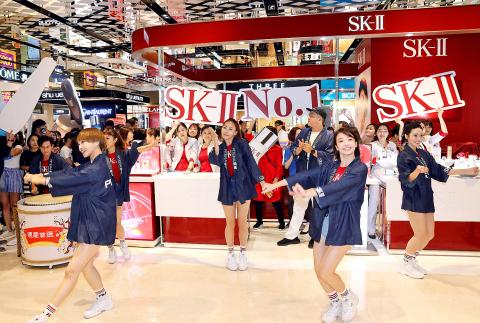Shin Kong Mitsukoshi Department Store Co (新光三越百貨) yesterday said that sales at its four stores in Taipei’s Xinyi District (信義) would reach NT$1 billion (US$32.59 million) on the first day of its month-long anniversary event, thanks to robust sales of home appliances and cosmetics products.
The sales event began yesterday and is to end on Nov. 11.
The Xinyi stores — A4, A8, A9 and A11 — are forecast to generate combined anniversary sales of NT$5.6 billion this year, up 1 percent from last year’s event, the company said.

Photo: CNA
The four stores saw a 5 percent sales growth in the first half of this year, the company said, without giving exact figures.
Overall anniversary sales from its 15 stores nationwide are expected to reach NT$20.4 billion this year, it added.
“Average consumption per customer is expected to remain steady, but the customer flow today seems lower than a year ago,” Shin Kong Mitsukoshi executive vice president Richard Wu (吳昕陽) said.
An unstable global political and economic environment has negatively affected Taiwan’s economy and therefore the department store’s customer flow, Wu said.
The Xinyi stores saw strong first-day sales of Estee Lauder, SK-II and Lancome cosmetics and skincare products, while sales of vacuum cleaners, air purifiers, large-screen TVs and air fryers showed the greatest growth among home appliances this year, Shin Kong Mitsukoshi said.
As temperatures drop, sales of major apparel brands are likely to grow, it said.
The company said that it plans to raise average sales per customer by offering discounts and gifts, as well as special offers through its mobile app.

TAKING STOCK: A Taiwanese cookware firm in Vietnam urged customers to assess inventory or place orders early so shipments can reach the US while tariffs are paused Taiwanese businesses in Vietnam are exploring alternatives after the White House imposed a 46 percent import duty on Vietnamese goods, following US President Donald Trump’s announcement of “reciprocal” tariffs on the US’ trading partners. Lo Shih-liang (羅世良), chairman of Brico Industry Co (裕茂工業), a Taiwanese company that manufactures cast iron cookware and stove components in Vietnam, said that more than 40 percent of his business was tied to the US market, describing the constant US policy shifts as an emotional roller coaster. “I work during the day and stay up all night watching the news. I’ve been following US news until 3am

Six years ago, LVMH’s billionaire CEO Bernard Arnault and US President Donald Trump cut the blue ribbon on a factory in rural Texas that would make designer handbags for Louis Vuitton, one of the world’s best-known luxury brands. However, since the high-profile opening, the factory has faced a host of problems limiting production, 11 former Louis Vuitton employees said. The site has consistently ranked among the worst-performing for Louis Vuitton globally, “significantly” underperforming other facilities, said three former Louis Vuitton workers and a senior industry source, who cited internal rankings shared with staff. The plant’s problems — which have not

TARIFF CONCERNS: The chipmaker cited global uncertainty from US tariffs and a weakening economic outlook, but said its Singapore expansion remains on track Vanguard International Semiconductor Corp (世界先進), a foundry service provider specializing in producing power management and display driver chips, yesterday withdrew its full-year revenue projection of moderate growth for this year, as escalating US tariff tensions raised uncertainty and concern about a potential economic recession. The Hsinchu-based chipmaker in February said revenues this year would grow mildly from last year based on improving supply chain inventory levels and market demand. At the time, it also anticipated gradual quarter revenue growth. However, the US’ sweeping tariff policy has upended the industry’s supply chains and weakened economic prospects for the world economy, it said. “Now

COLLABORATION: Given Taiwan’s key position in global supply chains, the US firm is discussing strategies with local partners and clients to deal with global uncertainties Advanced Micro Devices Inc (AMD) yesterday said it is meeting with local ecosystem partners, including Taiwan Semiconductor Manufacturing Co (TSMC, 台積電), to discuss strategies, including long-term manufacturing, to navigate uncertainties such as US tariffs, as Taiwan occupies an important position in global supply chains. AMD chief executive officer Lisa Su (蘇姿丰) told reporters that Taiwan is an important part of the chip designer’s ecosystem and she is discussing with partners and customers in Taiwan to forge strong collaborations on different areas during this critical period. AMD has just become the first artificial-intelligence (AI) server chip customer of TSMC to utilize its advanced